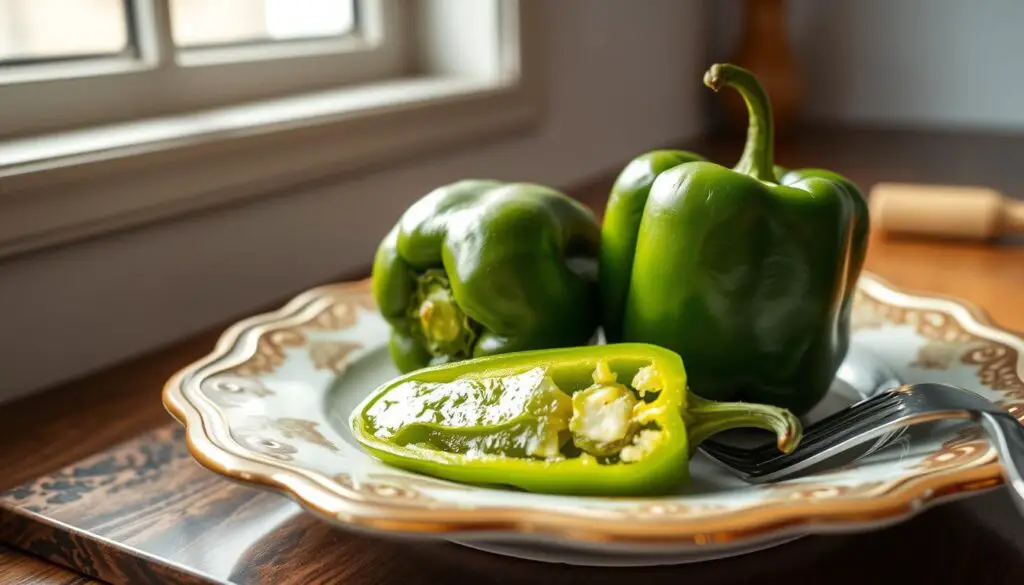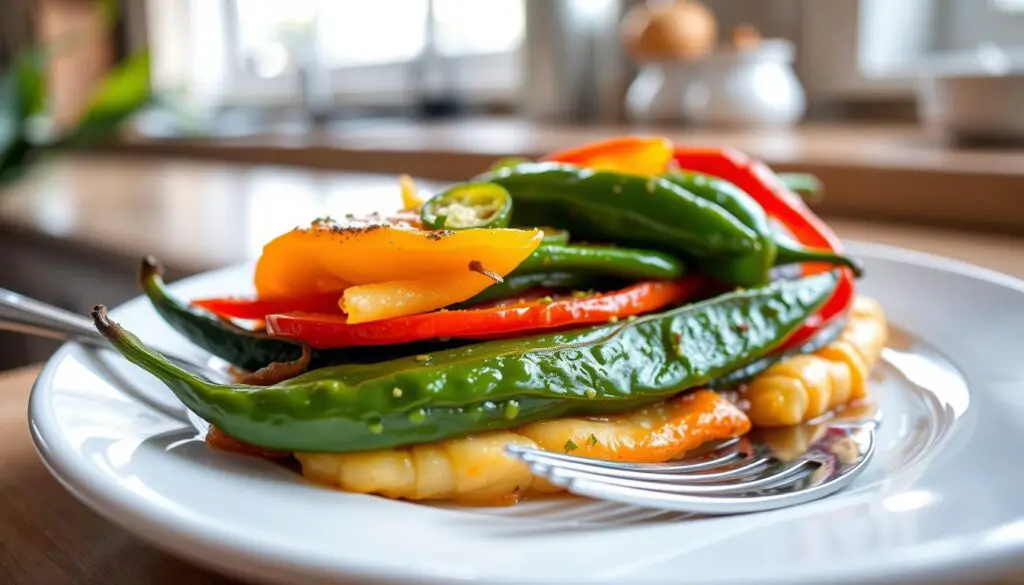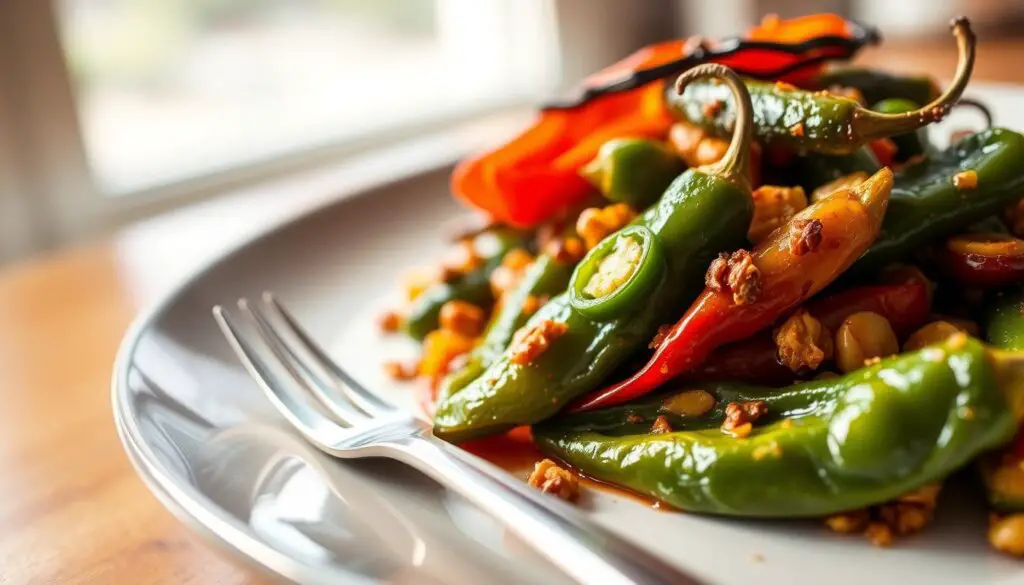When it comes to cooking, understanding the differences between poblano peppers and jalapeño peppers is essential for enhancing flavors in various dishes. Both of these peppers bring unique aromas and tastes, but they are distinct in more ways than one. This article delves into the comparison between poblano and jalapeño peppers, exploring their flavor profiles, heat levels, nutritional value, and culinary uses. By the end, you will have a clearer grasp of which pepper to choose, making your cooking experience even more enjoyable.
Key Takeaways
- Poblano peppers are not the same as jalapeño peppers.
- Each pepper has unique flavor profiles and culinary uses.
- Heat levels differ significantly, measured in Scoville ratings.
- Nutritional values vary, providing distinct health benefits.
- Choosing the right pepper enhances your dish’s overall flavor.
Introduction to Poblano and Jalapeño Peppers
In the culinary world, an introduction to different types of chilies unveils a rich tapestry of flavors and heat. Among these, poblano peppers and jalapeño peppers stand out for their unique characteristics and versatile uses.
Poblano peppers are mild in flavor, making them ideal for culinary applications such as stuffing or incorporating into sauces. Their deep, earthy taste enhances various dishes without overwhelming other ingredients. These peppers, often dried and called Ancho, contribute a gentle warmth that complements many meals.
Jalapeño peppers, in contrast, bring a spicier kick, making them a staple in salsas and fresh dishes. Their heat level varies, but they add a vibrant touch to foods, from nachos to grilled recipes. This spiciness pairs well with rich flavors, providing a perfect balance in many traditional and modern dishes.
Understanding these two types of chilies provides a foundation for exploring their individual qualities, culinary uses, and delightful flavor profiles that enhance countless recipes.
| Type of Chili | Flavor Profile | Common Uses |
|---|---|---|
| Poblano Peppers | Mild, earthy flavor | Stuffed dishes, sauces |
| Jalapeño Peppers | Spicy, vibrant taste | Fresh salsas, nachos |
Are poblano peppers the same as jalapeños?
Poblano and jalapeño peppers, both staples in Mexican cuisine, showcase distinct differences that set them apart. The poblano is notably larger and typically darker in color, presenting a rich, mild flavor. In contrast, the jalapeño appears smaller, brighter, and possesses a spicy kick that enthusiasts enjoy. A pepper comparison reveals that these peppers not only vary in size and heat level but also in culinary applications.
Understanding these differences is crucial for anyone looking to enhance their cooking with the right pepper. The poblano pepper is often chosen for its smokiness, making it ideal for stuffing or roasting. Alternatively, jalapeños find their home in fresh salsas, sauces, and countless dishes that require a bold punch of heat.

In summary, recognizing these key differences between poblano and jalapeño peppers can elevate any culinary endeavor. This appreciation for their unique properties contributes to creating diverse and flavor-rich dishes while respecting the authentic nature of Mexican cuisine.
Flavor Profiles of Poblano and Jalapeño Peppers
Understanding the flavor profiles of poblano and jalapeño peppers enriches culinary experiences. Each offers distinct characteristics that can elevate dishes immensely.
Understanding Poblano Flavor
Poblano peppers are known for their complex, earthy flavor with a mild level of heat. This robust taste allows them to shine in various culinary uses. Roasting them enhances their sweetness, offering a delightful addition to recipes. Poblano flavor works exceptionally well in dishes like chile rellenos, where the tenderness of the pepper complements heartier ingredients.
Understanding Jalapeño Flavor
In contrast, jalapeño peppers provide a bright, fresh taste imbued with spicy notes. The level of heat can vary, making them versatile for culinary uses. Their distinctive jalapeño flavor is often integral in fresh salsas, adding zest and vibrancy to any meal. Whether used in pickling or grilling, jalapeños can elevate appetizers and main courses through their pronounced spiciness.
| Feature | Poblano Peppers | Jalapeño Peppers |
|---|---|---|
| Flavor Profile | Earthy, mild | Bright, fresh, spicy |
| Heat Level | Low | Medium to High |
| Culinary Uses | Stuffing, roasting, sauces | Salsas, pickling, grilling |
Exploring the different profiles underscores how poblano and jalapeño peppers not only differ in taste but also in their role in a wide array of dishes. Discovering paired sauces can further enhance these flavors, making an exploration of options essential for any culinary enthusiast. For innovative ideas, check out a guide on sauces that perfectly complement breakfast burritos.
Hotness Levels: Scoville Ratings Explained
Understanding the hotness levels of peppers is essential for appreciating their culinary roles. The Scoville ratings provide a clear measurement of this heat, making it easier for cooks and consumers to choose their preferred varieties. Two popular peppers, poblano and jalapeño, showcase a range of heat that appeals to different tastes.
Poblano Peppers and Their Scoville Heat Units
Poblano peppers typically range from 1,000 to 2,500 Scoville Heat Units (SHU), classifying them as mild peppers. This level of poblano heat makes them suitable for various dishes, particularly for those who might be sensitive to spiciness. Their ability to offer flavor without overwhelming heat makes them a staple in many recipes.
Jalapeño Peppers and Their Scoville Heat Units
In contrast, jalapeño peppers fall into the moderate heat category, averaging between 2,500 and 8,000 SHU. The variability of jalapeño heat can be influenced by factors such as ripeness and growing conditions. This range allows for flexibility in culinary use, accommodating those who enjoy a bit more spice while still being approachable for many palates. For more detailed insights into heat levels, the Scoville ratings offer a comprehensive look at pepper heat.

Common Culinary Uses for Poblano and Jalapeño
Poblano and jalapeño peppers are staples in many kitchens, celebrated for their distinct flavors and versatility in various culinary applications. Each pepper brings unique attributes to dishes, enhancing both taste and nutritional value.
Poblano Peppers in Traditional Dishes
Poblano peppers find their way into numerous traditional dishes, celebrated for their mild heat and rich flavor. A well-known preparation is chile rellenos, where the peppers are skillfully stuffed with cheese or meat and then coated in batter before frying. The deep, earthy tones of poblano pair wonderfully with mole sauces, typically served over meats or enchiladas to elevate the meal’s flavor profile.
- Chile Rellenos
- Stuffed Peppers
- Mole Sauces
Jalapeño Peppers in Mexican Cuisine
Jalapeño peppers are fundamental in Mexican cuisine, serving as the backbone for countless jalapeño recipes. These peppers contribute an invigorating kick to fresh salsas and various sauces, making them perfect for toppings on tacos, burritos, or grilled meats. Additionally, jalapeños are commonly pickled to extend their shelf life and create a zesty addition to sandwiches and burgers.
- Fresh Salsas
- Pickled Jalapeños
- Grilled Toppings
In summary, both poblano and jalapeño peppers are indispensable in enhancing traditional dishes and are easily incorporated into a variety of culinary creations. For those seeking to explore further, refer to this informative resource that highlights the benefits of incorporating flavorful ingredients in every meal.
Comparing Nutritional Values of Poblano and Jalapeño Peppers
Poblano peppers and jalapeño peppers not only enhance culinary dishes but also offer significant nutritional value. Each type of pepper has its unique vitamins and minerals, contributing to a balanced diet. This section examines the specific nutritional components of each pepper, highlighting their benefits.
Vitamins and Minerals in Poblano Peppers
Poblano peppers are particularly notable for their content of vitamins A and C. These essential vitamins play crucial roles in maintaining healthy vision and boosting the immune system. In addition, poblano peppers contain potassium, which is vital for heart health, and dietary fiber that aids digestion. The combination of these nutrients contributes significantly to the overall nutritional value of poblano peppers.
Vitamins and Minerals in Jalapeño Peppers
Jalapeño peppers shine with their high levels of vitamin C and B6. Vitamin C serves as a powerful antioxidant, while B6 is essential for brain health and the regulation of mood. Furthermore, jalapeños contain beneficial antioxidants that can combat inflammation, enhancing their overall health benefits. The nutritional value of jalapeño peppers makes them a great addition to various dishes.

By incorporating both poblano and jalapeño peppers into meals, individuals can take advantage of their unique vitamins and minerals, promoting better health and well-being.
Health Benefits of Poblano and Jalapeño Peppers
Poblano and jalapeño peppers are not only delicious additions to various dishes but also offer significant health benefits. Both peppers are low in calories, making them an excellent choice for those looking to enhance their meals without adding extra calories.
These peppers are rich in vitamins and offer a good amount of dietary fiber. Poblano peppers are particularly high in vitamin A and vitamin C, both of which support immune health and skin vitality. Jalapeños, on the other hand, are renowned for their capsaicin content, a compound known to promote metabolism and provide pain relief. This unique feature contributes to their appeal in both culinary and health circles.
Incorporating these peppers into daily meals can help boost overall wellness, thanks to their antioxidant properties. Antioxidants play a crucial role in combating oxidative stress, which can lead to chronic diseases. Both poblano and jalapeño peppers contain these beneficial compounds, making them a smart addition to a balanced diet.
| Health Benefits | Poblano Peppers | Jalapeño Peppers |
|---|---|---|
| Calories | Low (about 20 calories per 100g) | Low (about 27 calories per 100g) |
| Vitamin C | High | Very High |
| Vitamin A | High | Moderate |
| Capsaicin | Absent | Present |
| Antioxidants | Contains | Contains |
How to Choose Between Poblano and Jalapeño Peppers
When it comes to choosing peppers, both poblano and jalapeño varieties have unique characteristics that can greatly affect your cooking experience. Understanding your flavor needs and heat preferences will guide you toward the best option for your recipes.
Poblano peppers bring a mild, earthy flavor, making them suitable for dishes that require depth without overwhelming heat. They are ideal for recipes like stuffed peppers or mole sauce. For those who enjoy a bit of spice, the jalapeño offers a zesty punch, perfect for salsas or adding heat to tacos.
While selecting the right pepper, consider the following:
- Flavor Needs: Decide if you prefer a rich, subtle taste (poblano) or a bright, spicy kick (jalapeño).
- Heat Preferences: Poblano peppers typically register around 1,000 to 2,000 Scoville Heat Units, while jalapeños range from 2,500 to 8,000, appealing to those seeking varying levels of heat.
- Recipe Suitability: Match the pepper to your dish; use poblano for creamy sauces and jalapeños for fresh, zesty dishes.
Ultimately, choosing peppers is a matter of personal taste and the specific flavors you wish to enhance in your cooking.
Storing and Preserving Poblano and Jalapeño Peppers
Proper storing peppers is vital for maintaining their quality, freshness, and shelf-life. Both poblano and jalapeño peppers can be stored effectively using a few simple techniques. Fresh peppers thrive in the refrigerator, where they can last for up to one week if kept in a breathable plastic bag. For maximum freshness, avoid washing them until ready for use.
Preserving peppers is another great way to ensure their longevity. Roasting poblano peppers enhances their flavor, and once cooled, they can be frozen in airtight containers. This method retains much of their taste while extending shelf-life significantly, allowing the peppers to be enjoyed long after the harvest.
For jalapeño peppers, drying is a popular preserving technique. Using a dehydrator or an oven on low heat can evaporate moisture, thereby extending the shelf-life for several months. Dried jalapeños can be stored in airtight jars away from sunlight, maintaining their flavor and heat.
In summary, knowing how to effectively store and preserve these peppers not only extends their shelf-life but also enhances the culinary experience. Implementing these techniques leads to a steady supply of flavorful peppers ready for a variety of dishes.
Conclusion
In summary, understanding the differences and similarities between poblano peppers and jalapeño peppers is essential for anyone looking to enhance their culinary choices. Poblano peppers, with their mild heat and rich flavor, are perfect for roasting and stuffed dishes, while jalapeño peppers bring a kick that can elevate a wide range of recipes. Each pepper offers unique taste profiles and nutritional benefits, making them both valuable additions to any kitchen.
As we explored, the Scoville ratings illustrate the varying heat levels that can influence the dish’s final outcome. By recognizing how these peppers can be used creatively, home cooks and professional chefs alike can experiment with diverse flavors and textures. Therefore, whether you find yourself reaching for poblano peppers or jalapeño peppers, remember that the right choice ultimately boils down to personal preference and the specific requirements of your culinary ventures.
Encouraging readers to try both peppers can unlock new taste experiences. Incorporating poblano and jalapeño peppers into your meals will not only enhance flavors but also provide a delightful twist to traditional recipes. Embrace the challenge and enjoy the journey of discovery with these vibrant ingredients.

Can you be more specific about the content of your article? After reading it, I still have some doubts. Hope you can help me.
Thank you for your sharing. I am worried that I lack creative ideas. It is your article that makes me full of hope. Thank you. But, I have a question, can you help me?
Can you be more specific about the content of your article? After reading it, I still have some doubts. Hope you can help me.
Your point of view caught my eye and was very interesting. Thanks. I have a question for you.